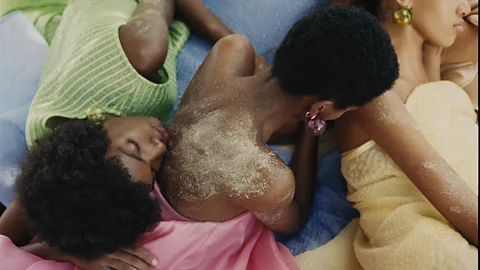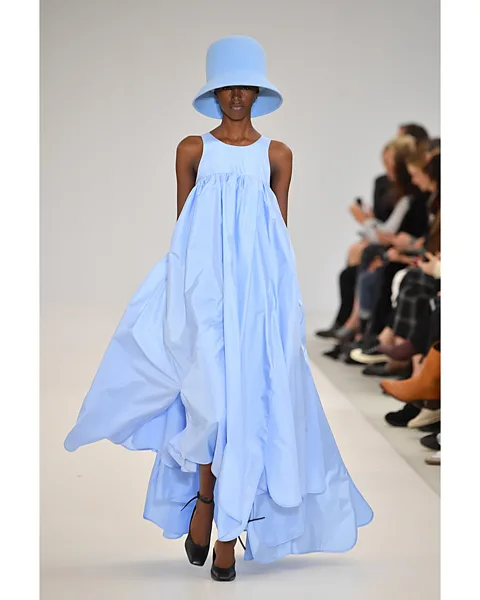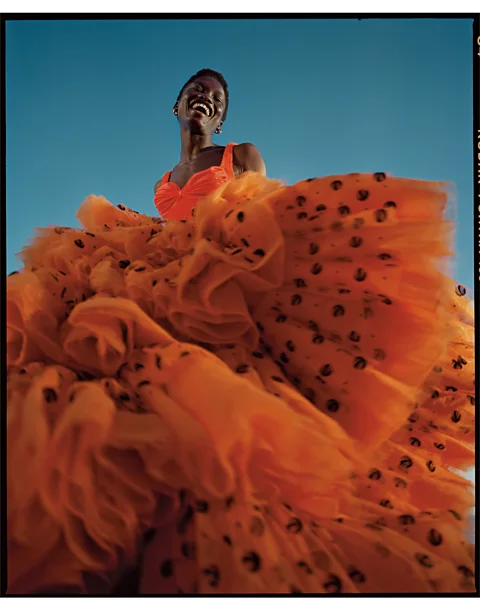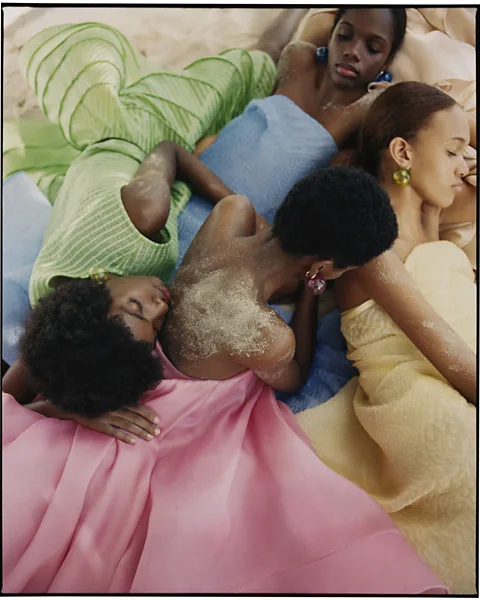'Soft Girl': The radical trend millennials love
 Nadine Ijewere
Nadine IjewereThe "Soft Girl" aesthetic began life among Nigerian social media influencers, and has since gone mainstream. Evie Muir explores the ideas behind it, and why it has found particular resonance among young black women.
In the 1960s there were the mods and rockers. The 70s saw the disco and flower power eras, while in the 80s, new romantic style had its heyday. Fast forward to the present however, and if you have succumbed to the escapist realms of TikTok, your evening scroll through will have likely exposed you to a whole new world of subcultures. Unfolding at a rapid pace, these aesthetics and styles – which reach dizzying heights as far as likes and engagements are concerned – see the lines between fashion and beauty blur with lifestyle, culture and identity. How we dress and the way we look, these trends tell us, communicate an outward expression of how we choose to live. In recent years it's been hard to miss the Soft Girl trend on TikTok, a #SoftGirl aesthetic that is, as The Trend Spotter puts it, full of "pastel colours, fluttering butterflies and warm fluffy clouds", and as The List says, "slightly-cottagecore, super-femme".
More like this:
However, there is more to "Soft Girl" than pretty pastels and cutesy accessories. Before migrating to Western consciousness by way of social media, the concept of a Soft Life originated in the Nigerian influencer community. In a context where Nigeria is experiencing its own cost of living crisis, a soft life was never about the flamboyant expressions of materialism or wealth that we'd normally associate with a life of leisure. It doesn't mean expensive spa days or luxury travel. Rather, it asks us to don our most comfortable outfit and consider what a day-to-day life of ease would look like for ourselves. Then, it challenges us to put this into practice. The aesthetic has even recently been described as the precursor to the "quiet quitting" trend. Having rapidly evolved into a wider movement, with #SoftLife and #SoftGirlSummer trending alongside it, it's unsurprising that the #SoftBlackGirl phenomenon has resonated with black women and girls so deeply.
 Getty Images
Getty ImagesArguably, the Soft Black Girl phenomenon is a backlash against the persistent "strong black woman" trope in our culture, which, alongside the "girl boss" ideal, can feel like a burden, continuously demanding our energy, whether at work or in relationships with others. The 'Soft Life' offers us an alternative, and makes it okay to expend energy on ourselves instead. As black women, we're rarely given the opportunity to imagine and dream a life for ourselves on our own terms. Yet with more than 400 million TikTok videos brandishing the hashtag – declaring aphorisms such as "Slow living tip: adopt the mindset that you deserve rest" and "Welcome to Black Woman Bare Minimum, a safe space where you can do the least, and be the most" – this unlikely corner of the internet offers us a template to do so. As we're inundated with visions of slow, intentional, purposeful living, we see that a soft life is as diverse and nuanced as black women are ourselves.
While some may interpret a soft life to be a relinquishing of financial responsibility in order to live a lavish lifestyle, the soft life, for me, goes beyond an aesthetic to a deeper meaning. It's explorative and creative, allowing me to experiment with approaches to work-life balance, finding the confidence to set boundaries and sit with the discomfort of doing so, question automatic responses, seek healthy coping mechanisms, and build the ones that feel nourishing into my daily routine. Wild swimming, somatics, hiking and nature writing are all things that I have in my control and that don't cost a penny. How often do we ask ourselves what we need, what makes us feel good, and then find ways to meet those needs without having to rely on others? Softness is ultimately rooted in self-care, and is how I experience empowerment.
Radical rest
The terms "radical rest" and "radical self-care" have long been advocated by black feminists who spoke about how self-care and self-love are the foundations of any collective movement. In her 1999 book, All About Love: New Visions, bell hooks explored how showing ourselves self-love, compassion and acceptance is an act of softness. "One of the best guides to how to be self-loving is to give ourselves the love we are often dreaming about receiving from others," she wrote. "It is silly, isn't it, that I would dream of someone else offering to me the acceptance and affirmation I was withholding from myself."
A Soft Life philosophy can also be found in the works of poet and author Audre Lorde, who in her 1988 book of essays, A Burst of Light, wrote of her own journey with rest and softness as a parallel to physical wellbeing, and introduces the idea of rest as both a personal and political act. "I had to examine, in my dreams as well as in my immune-function tests, the devastating effects of overextension. Overextending myself is not stretching myself. I had to accept how difficult it is to monitor the difference. Necessary for me as cutting down on sugar. Crucial. Physically. Caring for myself is not self-indulgence, it's self-preservation, and that is an act of political warfare."
 Nadine Ijewere
Nadine IjewereSimilarly, the activist Professor Angela Davis continues to remind future generations that softness is the bedrock of community, and the foundation of racial justice movements. In an interview with Afropunk, Davis says, "anyone who's interested in making change in the world, also has to take care of himself, herself, their-selves. For a long time, activists didn't necessarily think that it mattered to take care of themselves in terms of what they eat, mental self-care, spiritual self-care and so on," she reflects. "I think our movement would have been very different, had we understood that kind of self-care. Personally I started practising yoga and meditation when I was in jail, but it was more of an individual practice. Later I had to recognise the importance of emphasising the collective character of that work on the self."
As The Nap Ministry's Tricia Hersey says: "To not rest is really being violent towards your body. To align yourself with a system that says 'your body doesn't belong to you, keep working, you are simply a tool of production' is a slow spiritual death… Rest is a form of resistance because it disrupts and pushes back against capitalism".
Returning to and reclaiming the outdoors also opens up opportunities for our communities to heal from the ongoing legacies of racialised and gendered trauma. Forging time to spend in nature, and building our confidence to do so, is softness in practice. Peaks of Colour (which I founded), All the Elements and Black2Nature are just some of the organisations set up to help diverse groups to enjoy nature and the outdoors.
The reality though is that adopting a soft life isn't in fact easy – it's a journey of rebuilding that requires patience and care. Kaya Nova, founder of Grown Mag, has been documenting her Soft Girl journey on TikTok. In a message to those who may be finding the process difficult, she addresses something that often gets left out of popular discourse: the discomfort of seeking comfort, and the growing pains involved. "Choosing softness means welcoming vulnerability, and when you're more vulnerable things can hurt a little harder than they used to. When I first chose softness it felt like the world got harder, but it was actually because I was giving myself space and time to feel my emotions, versus jumping into solution mode. So my first experience in my Soft Girl era did not feel like ease at all… it wasn't any of the things that are aesthetically soft. Honestly, it was quite brutal, and every day since is a challenge to stay in that soft space: asking for help, saying when I don't know how to do something, taking something off of my plate instead of trying to do it all, and just staying in this space of these feelings."
 Nadine Ijewere
Nadine IjewereSoftness as resistance also informs the work of Nadine Ijewere, an award winning south-east London-born fashion photographer who was the first woman of colour to shoot the cover of any Vogue edition. Informed by her own Nigerian-Jamaican identity, Ijewere's work showcases a new standard of beauty, and aims to give life to the uniqueness of disparate cultures. It is currently exhibited at the Saatchi Gallery as part of The New Black Vanguard exhibition. Works such as Joy as an Act of Resistance – a joyous smile amidst an explosion of orange tulle – or images from her recent Nina Ricci campaign – four black women, draped in pastel, resting on each other's strength – capture softness in action.
"In the past and still today we have been shown a lot of images of black people suffering, being incarcerated and ridiculed," Ijewere tells BBC Culture. "Over time these images have created stereotypes. Black trauma is very comfortably shared. Why is black joy not shared as frequently? I love to capture beauty, happiness and community. The truth is there's a soft side to all of us that no one really sees. As time goes on I am learning through my work to give myself the same love and attention. It's a tough industry to navigate, especially as a black woman. It's important to me to check in with myself. We all should."
The black women pioneering the simple pleasures and bold ideas of a soft life can too be seen as a vanguard. As Ijewere puts it: "We all know how powerful imagery is, how it has shaped the lives of the people before us and how it will shape the lives of those to come. Undiscussed, we are creating references for a softer existence. There will always be reference to the hard life, but it's not the only option."
For a social media trend to have nurtured a movement of black women – pioneers leading the way in redefining strength as softness, and reclaiming a life of joy and healing – is something of a quiet revolution. So, snuggle up in your comfiest outfit, take yourself on a walk, or curl up by the fire, and be prepared to allow yourself vulnerability. Be gentle with yourself as you battle with an internal dialogue that requires repetitive self-talk, self-questioning and ultimately, self-love. Feel the liberating sense of freedom as habits, patterns and expectations are discarded, then melt into the creative, imaginative, possibilities of what a soft life could look like, for you.
The New Black Vanguard: Photography between Art and Fashion is at the Saatchi Gallery, London, until 23 January 2023.
And if you liked this story, sign up for the weekly bbc.com features newsletter, called The Essential List. A handpicked selection of stories from BBC Future, Culture, Worklife and Travel, delivered to your inbox every Friday.
